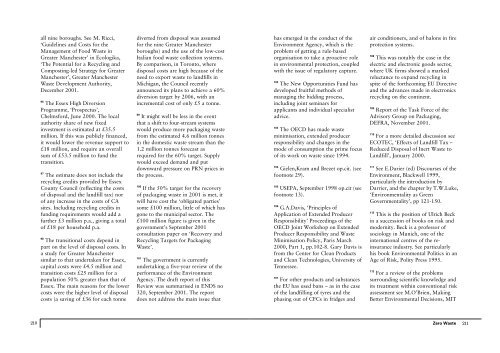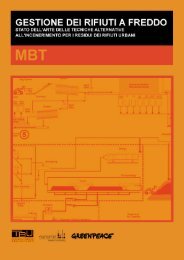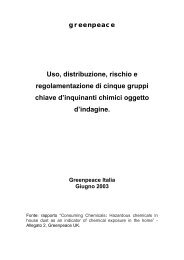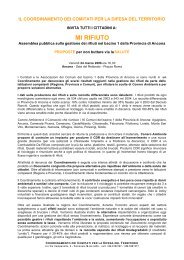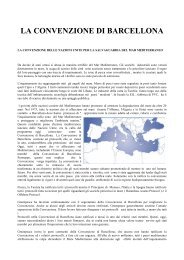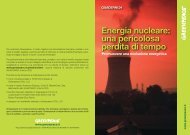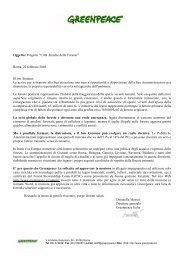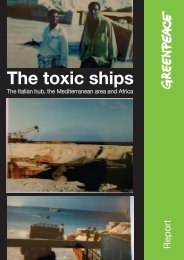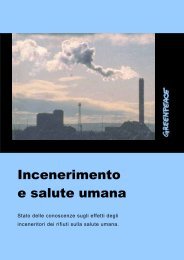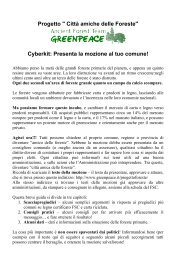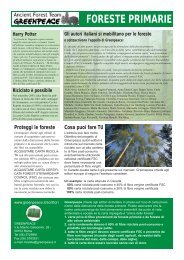Zero Waste by Robin Murray, Greenpeace Environmental Trust 2002
Zero Waste by Robin Murray, Greenpeace Environmental Trust 2002
Zero Waste by Robin Murray, Greenpeace Environmental Trust 2002
Create successful ePaper yourself
Turn your PDF publications into a flip-book with our unique Google optimized e-Paper software.
all nine boroughs. See M. Ricci,<br />
‘Guidelines and Costs for the<br />
Management of Food <strong>Waste</strong> in<br />
Greater Manchester’ in Ecologika,<br />
‘The Potential for a Recycling and<br />
Composting-led Strategy for Greater<br />
Manchester’, Greater Manchester<br />
<strong>Waste</strong> Development Authority,<br />
December 2001.<br />
96<br />
The Essex High Diversion<br />
Programme, ‘Prospectus’,<br />
Chelmsford, June 2000. The local<br />
authority share of new fixed<br />
investment is estimated at £35.5<br />
million. If this was publicly financed,<br />
it would lower the revenue support to<br />
£18 million, and require an overall<br />
sum of £53.5 million to fund the<br />
transition.<br />
97<br />
The estimate does not include the<br />
recycling credits provided <strong>by</strong> Essex<br />
County Council (reflecting the costs<br />
of disposal and the landfill tax) nor<br />
of any increase in the costs of CA<br />
sites. Including recycling credits in<br />
funding requirements would add a<br />
further £3 million p.a., giving a total<br />
of £18 per household p.a.<br />
98<br />
The transitional costs depend in<br />
part on the level of disposal costs. In<br />
a study for Greater Manchester<br />
similar to that undertaken for Essex,<br />
capital costs were £4.5 million and<br />
transition costs £25 million for a<br />
population 50% greater than that of<br />
Essex. The main reasons for the lower<br />
costs were the higher level of disposal<br />
costs (a saving of £36 for each tonne<br />
diverted from disposal was assumed<br />
for the nine Greater Manchester<br />
boroughs) and the use of the low-cost<br />
Italian food waste collection systems.<br />
By comparison, in Toronto, where<br />
disposal costs are high because of the<br />
need to export waste to landfills in<br />
Michigan, the Council recently<br />
announced its plans to achieve a 60%<br />
diversion target <strong>by</strong> 2006, with an<br />
incremental cost of only £5 a tonne.<br />
99<br />
It might well be less in the event<br />
that a shift to four-stream systems<br />
would produce more packaging waste<br />
from the estimated 4.6 million tonnes<br />
in the domestic waste stream than the<br />
1.2 million tonnes forecast as<br />
required for the 60% target. Supply<br />
would exceed demand and put<br />
downward pressure on PRN prices in<br />
the process.<br />
100<br />
If the 50% target for the recovery<br />
of packaging waste in 2001 is met, it<br />
will have cost the ‘obligated parties’<br />
some £100 million, little of which has<br />
gone to the municipal sector. The<br />
£100 million figure is given in the<br />
government’s September 2001<br />
consultation paper on ‘Recovery and<br />
Recycling Targets for Packaging<br />
<strong>Waste</strong>’.<br />
101<br />
The government is currently<br />
undertaking a five-year review of the<br />
performance of the Environment<br />
Agency. The draft report of this<br />
Review was summarised in ENDS no<br />
320, September 2001. The report<br />
does not address the main issue that<br />
has emerged in the conduct of the<br />
Environment Agency, which is the<br />
problem of getting a rule-based<br />
organisation to take a proactive role<br />
in environmental protection, coupled<br />
with the issue of regulatory capture.<br />
102<br />
The New Opportunities Fund has<br />
developed fruitful methods of<br />
managing the bidding process,<br />
including joint seminars for<br />
applicants and individual specialist<br />
advice.<br />
103<br />
The OECD has made waste<br />
minimisation, extended producer<br />
responsibility and changes in the<br />
mode of consumption the prime focus<br />
of its work on waste since 1994.<br />
104<br />
Gielen,Kram and Brezet op.cit. (see<br />
footnote 29).<br />
105<br />
USEPA, September 1998 op.cit (see<br />
footnote 13).<br />
106<br />
G.A.Davis, ‘Principles of<br />
Application of Extended Producer<br />
Responsibility’ Proceedings of the<br />
OECD Joint Workshop on Extended<br />
Producer Responsibility and <strong>Waste</strong><br />
Minimisation Policy, Paris March<br />
2000, Part 1, pp.102-8. Gary Davis is<br />
from the Center for Clean Products<br />
and Clean Technologies, University of<br />
Tennessee.<br />
107<br />
For other products and substances<br />
the EU has used bans – as in the case<br />
of the landfilling of tyres and the<br />
phasing out of CFCs in fridges and<br />
air conditioners, and of halons in fire<br />
protection systems.<br />
108<br />
This was notably the case in the<br />
electric and electronic goods sector,<br />
where UK firms showed a marked<br />
reluctance to expand recycling in<br />
spite of the forthcoming EU Directive<br />
and the advances made in electronics<br />
recycling on the continent.<br />
109<br />
Report of the Task Force of the<br />
Advisory Group on Packaging,<br />
DEFRA, November 2001.<br />
110<br />
For a more detailed discussion see<br />
ECOTEC, ‘Effects of Landfill Tax –<br />
Reduced Disposal of Inert <strong>Waste</strong> to<br />
Landfill’, January 2000.<br />
111<br />
See E.Darier (ed) Discourses of the<br />
Environment, Blackwell 1999,<br />
particularly the introduction <strong>by</strong><br />
Darrier, and the chapter <strong>by</strong> T.W.Luke,<br />
‘<strong>Environmental</strong>ity as Green<br />
Governmentality’, pp 121-150.<br />
112<br />
This is the position of Ulrich Beck<br />
in a succession of books on risk and<br />
modernity. Beck is a professor of<br />
sociology in Munich, one of the<br />
international centres of the reinsurance<br />
industry. See particularly<br />
his book <strong>Environmental</strong> Politics in an<br />
Age of Risk, Polity Press 1995.<br />
113<br />
For a review of the problems<br />
surrounding scientific knowledge and<br />
its treatment within conventional risk<br />
assessment see M.O’Brien, Making<br />
Better <strong>Environmental</strong> Decisions, MIT<br />
210<br />
<strong>Zero</strong> <strong>Waste</strong><br />
211


